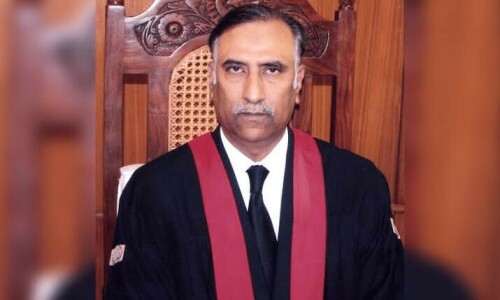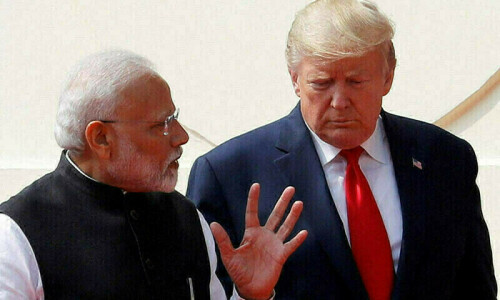WASHINGTON, Feb 6: The United States, United Kingdom and France have weighed in on a court decision to release nuclear scientist Dr A.Q. Khan from house arrest with statements expressing concerns, even worries.
All the statements expressed unease over the court decision. A statement by White House sought assurances that Dr Khan would not get involved in nuclear proliferation again. On its part, the UK called on the Pakistani government to allow IAEA access to the nuclear scientist.
“Obviously we’ve seen the reports of the release, but have not received ... official word from the government,” White House spokesman Robert Gibbs said.
“And as we hear from the government about these reports, obviously the president and this government want assurances that Dr Khan is not involved or engaged in any of the activity that resulted in his house arrest earlier.”
US Secretary of State Hillary Rodham Clinton said that she was “very much concerned” about Dr Khan’s release because the United States believed he was involved in leaking nuclear technology and secrets.
The State Department said that Dr Khan’s release from de facto house arrest would be “extremely regrettable” and “unfortunate”.
‘Serious risk’
State Department spokesman Gordon Duguid told reporters that Mr Khan remained a “serious proliferation risk”. He said the United States was still trying to confirm Dr Khan’s official status.
In response to a query about British government’s reaction to Dr Khan’s release, a spokesperson for the Foreign and Commonwealth Office said: “We have read about the release of Dr A.Q. Khan and we continue to call on government of Pakistan to allow IAEA access to Dr Khan in order to seek information about nuclear proliferation activities, in particular the smuggling of nuclear secrets to Iran and North Korea.”
Pakistan has prevented foreign investigators from questioning Dr Khan, insisting it has passed on all relevant information about nuclear proliferation. That bar is likely to remain.
Interestingly, only this week British Foreign Secretary David Miliband while discussing his country’s nuclear policy had said that nuclear weapons remained potentially the most destructive threat to global security.
He said: “There is increasing concern over the risks of nuclear weapons spreading to states like Iran and North Korea or to terrorists.”
France too voiced its unease over the court decision, added AFP.
“We are obviously a little concerned by this decision,” said foreign ministry spokesman Eric Chevallier. “We hope that the proliferation activities of Mr Khan and his network in the past are absolutely over,” he said.
“We know what role Mr Khan and his network played in the spread worldwide of nuclear technology for military use. We hope that this release will not lead to the pursuit of these activities which are illegal, dangerous and very worrying for international security.”
‘Very alarming’
A leading US lawmaker said the Congress would take into consideration the court decision when it next considered aid for Pakistan.
Democratic Representative Howard Berman, who chairs the House Foreign Affairs Committee, called “very alarming” the decision to free the nuclear scientist.
“Congress will take this into account as we review and create legislation on US-Pakistan relations and the circumstances under which US assistance is provided to Islamabad,” he said.















































Dear visitor, the comments section is undergoing an overhaul and will return soon.